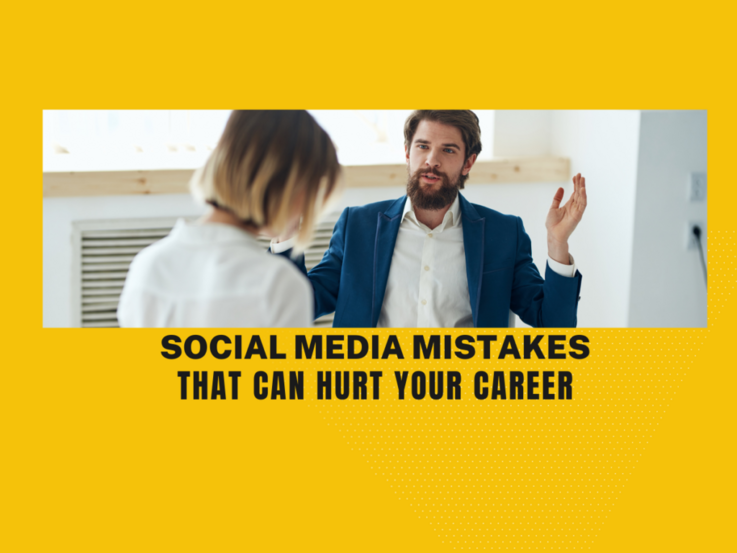3 SOCIAL MEDIA MISTAKES THAT COULD BE HURTING YOUR CAREER
Seven out of ten employers admit to checking a job candidates’ social media accounts during the hiring process. This process is called cybervetting.
In short, the employer is doing a background check by “googling” an applicant. They may or may not inform the applicant, but most of them don’t. If a prospective employer asks for a link to your social media accounts, they are indirectly telling you that they will be checking on you.
If you still don’t get it, it means whatever they see on your socials becomes part of your curriculum vitae. Why? Because whether you realise it or not, your profile IS your personal brand.
Your name, your profile, and your posts tell the world a lot about who you really are – your values, the quality and scale of your connections, the level and quality of your engagements, etc. Have you assessed your socials lately (Facebook, Instagram, LinkedIn, Twitter, YouTube, and Snapchat)? What do your social networks put across? Are they helping your career?
A Swiss company disseminated a memo across their global offices restricting employees to post any personal photo showing their company logo. That is how much they guard their brand. How is your personal brand?
Did you know that employers who use social network sites to probe job candidates continue to check social media platforms to monitor their employees’ online presence? It’s true! Forty-eight percent of them do, according to CareerBuilders’ survey. And as a result, 34% of these employers have fired or penalised employees based on the content found on their socials.
What are employers looking for?
- Online Presence
According to Jobvite, a software and recruiting corporation, LinkedIn has dropped from 92% in 2017 to 72% in 2020 as recruiters’ source of job candidates, while Instagram grew from 18% in 2017 to 37% in 2020. Anyhow, these channels remain to be a recruiters‘ marketplace for prospects – LinkedIn (72%), Facebook (60%), Twitter (38%), Instagram (37%), Glassdoor (36%), and YouTube (27%).
Ninety-three percent of recruiters review their candidate’s social profile before deciding, and seventy-three percent of recruiters hire candidates from these platforms. LinkedIn for professional check while Facebook, Twitter, and Instagram for more of a candidate’s moral qualities, personality, and character.
Online presence allows you to be findable and referral-ready at all times. Your URL is your digital calling card. Being on top of your engagements helps to avoid any incorrect information that may be going around about you. And, the absence of online presence sends a different message to prospective employers. They assume you are hiding something. Forty-seven percent of employers claim there is a slim chance that they would call a prospective applicant for an interview if they cannot find him/her online. It is because they would like to gather more information before inviting the candidate for an interview. Twenty percent of them expect the candidates to have an online presence.
- Inappropriate Posts
Needless to say, as a professional, you need to steer clear from posting and sharing sensitive images and videos, making discriminatory remarks and unprofessional declarations about your company, peers, or previous employers, especially sharing proprietary information.
Social media posts should also be limited to off working hours. You do not want your employers or prospective employers to suspect you are not doing your work during company hours, or you do not have enough work to do (unless of course, you are the social media manager of your company). You might think other people do it. That is beside the point. What is wrong remains wrong even if the whole world does it. What did we say about integrity? Doing what is right even if no one is watching. But don’t be fooled. A lot of corporations seek third parties to monitor social media networks for incriminating posts that may damage your corporate brand.
- Communication skills
Do you claim to be English proficient? Make sure your homepage proves it. Believe it or not, recruiters check your posts for language proficiency.
TAKE AWAY
Due to the widening use of social media networks, companies have found it a best practice to create social media policies and regulations to protect the company and its employees. And, a company’s onboarding process must include a session on these policies so a new hire will know what is allowed or not allowed concerning the use of company property (computers and mobile phones, if provided), company time, and corporate proprietary information. Some may think that this may seem a bit of a stretch, but you will be surprised by how people can be so careless and insensitive in their use of social media platforms.
This could be the best time to do a quality check of all your social media accounts. You might be creating a persona that is hurting your career opportunities.
In any case, a digitally obsessed person shouldn’t be so bothered at all with being e-stalked. Besides, a publicly shared profile is free for all. It just boils down to how responsible you are in your use of social media.
Social media is a very powerful tool. Use it with a lot of care and caution to avoid injury.
« Back